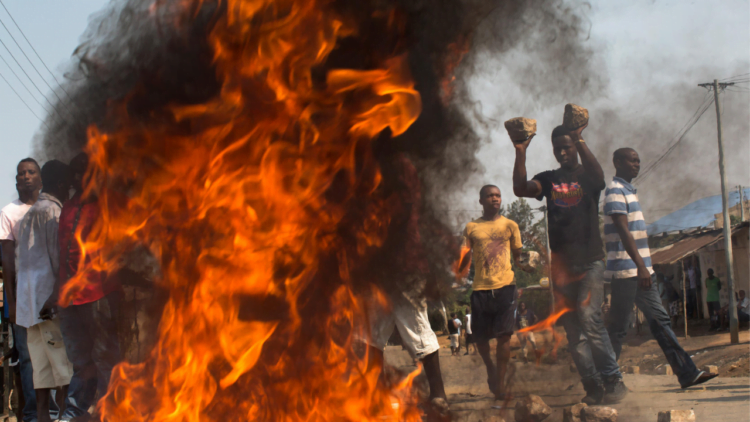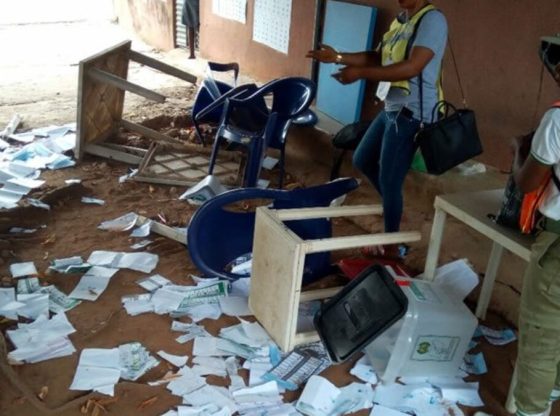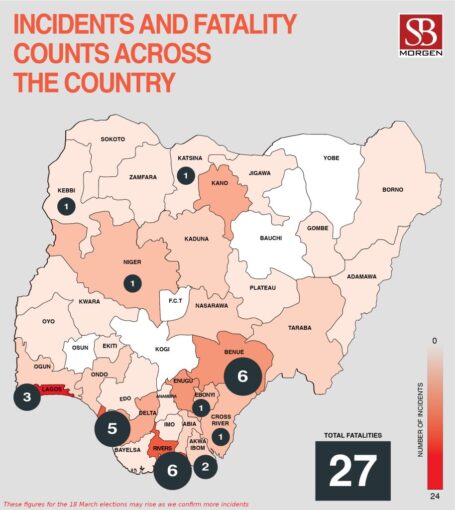Can Nigeria hold elections without violence?

On the morning of February 25, Ms. Jennifer Efidi stood in line to vote at her polling station on Dele Olubi Street, Surulere, Lagos, Nigeria. Out of the blue, violence erupted, and she ended up at a hospital after suffering a devastating blunt-force blow to her face. In a rare display of courage, she would return to cast her vote, her face wounded and her shirt soaked in blood. Her tragedy was not isolated. Many people suffered similar acts of violence in other parts of the country during keenly contested elections.

S.B.M. Intelligence is “Nigeria’s leading geopolitical intelligence platform,” according to information available on its website. The company has presented its study of known acts of disturbances in the recent elections of February 25. In the study titled “Incidents and Fatality Counts Across the Country,” the organization noted 27 fatalities, the highest figures coming from Benue and Rivers state. A study of S.B.M.’s chart shows that Benue state, in the country’s north, recorded the same number of incidents as Rivers state, in the country’s south. In the south, the diagram reveals the following:
- Six Fatalities in Rivers state
- Five fatalities in Delta state
- Three fatalities in Lagos state
- Two fatalities in Akwa Ibom state
- One fatality in Ebonyi and Cross Rivers state
In the northern part of the country, the following incidents are captured in the chart:
- Six fatalities in Benue state
- One fatality in Kebbi, Niger, and Katsina state.
(See chart).

On its part, the National Human Rights Commission (N.H.R.C.) has said “it received 450 human rights-related cases from the February 25 and March 18 elections in which 88 people died,” according to a report in The Peoples Gazette, a local news organization. PUNCH, another Nigerian newspaper, reports that the Independent National Electoral Commission (I.N.E.C.) has assured that the body will prosecute “over 200 persons arrested for various electoral offenses during the just-concluded general elections.”
Desperation, coupled with ethnic and religious sentiments, often fuels violence during elections in Nigeria, creating a toxic electoral culture that causes human lives. The lack of transparency and accountability from electoral officers adds fuel to the fire. As a result, the electorate mistrusts the officials.
As data has shown, there were widespread cases of destruction of electoral materials by louts, stabbings, burnings, gunshots, and even deaths. Many wonder what would it take to hold violence-free elections in Nigeria?
Analysts believe the situation calls for a root-and-branch study of underlying issues besetting democracy in Nigeria, and, indeed, most parts of the continent. The cynics wonder “Is it even possible to hold elections in Nigeria without a single case of a violent attack?
Researchers are looking at data to understand the pattern of this violence to proffer workable solutions. Severe punishment for offenders is often mentioned as an important part of the likely solutions. If punishment is proportionate to the crime committed, the analysts say, it would sufficiently deter future occurrences.

